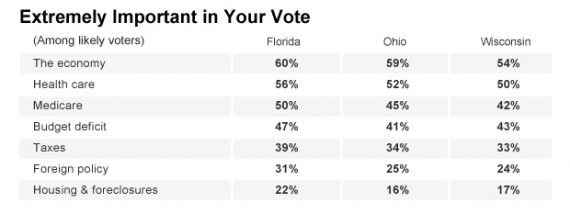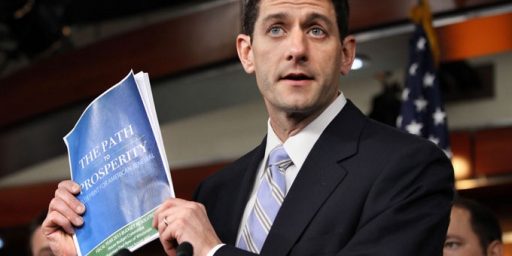Romney Gains In Two Swing States, But Medicare Problems Loom For The GOP
The Romney/Ryan ticket has gained grown in Wisconsin and Florida, and is steady in Ohio, but they've got a Medicare problem.
A new series of CBS/New York Times/Quinnipiac polls in three swing states shows the race is tightening, which is good news for Mitt Romney as he heads into the convention that will make him the Republican nominee for President. However, these polls also contain some potentially bad news for the Romney/Ryan ticket in that they show, not surprisingly, that the public does not support the changes to Medicare that are part of the Ryan Plan:
New CBS News/New York Times/Quinnipiac University poll numbers from three important swing states show a tight presidential race getting tighter.
The poll shows President Obama’s lead in Florida is down to just three points. Mr. Obama had a six-point lead there at the end of July.
The president is still leading Mitt Romney by six points in Ohio. In Wisconsin, home state of Romney’s running mate Rep. Paul Ryan, Romney’s now in a virtual tie with the president with just two points between them.
Tapping Ryan as his VP has moved the needle and made Wisconsin a battleground state. In the poll, one in three voters say they’re more likely to support Romney since he put Ryan on the ticket. Ryan is also viewed more favorably in the state than Vice President Joe Biden, who has negative ratings in all three swing states polled. Since the Ryan announcement, in those states, Republican enthusiasm for the election is up. GOP voters say they’re more excited about voting than they were four years ago by wide margins over Democrats.
This is an improvement for Romney in all three states from where the numbers were during the first round of polling that was released earlier this month. The biggest change, of course, has been in Wisconsin, where Obama was leading by six points in the first Quinnipiac poll. As I’ve noted here at OTB, though, here and here, the playing field has changed significantly in the Badger State since Paul Ryan was named to the ticket. Indeed, late yesterday, the Marquette University poll, which is highly respected inside the state, showed Obama’s lead cut to three points. Taking the new Q poll into account, that leaves Obama with a lead of only +1.4 in the RCP Average, which seems to pretty strongly indicate that Wisconsin is now a battleground state, which probably would not have happened if Ryan had not been added to the ticket. At the very least, this is helpful to the Romney campaign because it will require the Obama campaign to play defense in a state that they had probably entered the race thinking would be safely in the Democratic column.
In Florida, where Obama’s lead in the last Q polls has been cut in half and is now inside the margin of error, this poll is largely consistent with other recent polling, which shows the race in the Sunshine State to be very close. The RCP Average as of today is a tie between Romney and Obama, as a matter of fact. Not really surprising. We’ve known all along that Florida was going to be a battleground again, although there has been some speculation that Romney may have an advantage there, just as it has in every election since 2000. Hopefully, this time, the voters in Palm Beach County won’t get confused by the ballot.
The results in Ohio are identical to where they were a few weeks ago, with the President leading outside the margin of error. Other polls in the state, though, have shown a tighter race, with some even showing Romney in the lead. Right now, the RCP Average is at +2.0 in Obama’s favor. Again, an unsurprisingly close race. We’ll be watching the Buckeye State until late into the night on Election Day, I’m guessing.
So, all in all, the topline numbers show some good news for the Romney campaign. Tightening races in Florida and Wisconsin, and a stable but close race in Ohio. Once you look beyond the toplines, though, there’s plenty in the numbers for Romney’s people to be concerned about. Specifically, there appears to be some very stiff opposition to any kind of change in Medicare such as that contemplated by the Ryan Plan, or by Romney’s own plan:
The Romney-Ryan proposal to reshape Medicare by giving future beneficiaries fixed amounts of money to buy health coverage is deeply unpopular in Florida, Ohio and Wisconsin, according to new polls that found that more likely voters in each state trust President Obama to handle Medicare.
The Medicare debate was catapulted to the forefront of the presidential campaign this month when Mitt Romney announced that his running mate would be Representative Paul D. Ryan of Wisconsin, who is perhaps best known for proposing a budget plan, supported by Mr. Romney, to overhaul Medicare to rein in its costs.
After more than a week of frenzied campaigning on the issue, Medicare ranks as the third-most crucial issue to likely voters in Florida, Ohio and Wisconsin — behind the economy and health care, according to new Quinnipiac University/New York Times/CBS News polls of the three swing states. The Republican proposal to retool the program a decade from now is widely disliked.
Roughly 6 in 10 likely voters in each state want Medicare to continue providing health insurance to older Americans the way it does today; fewer than a third of those polled said Medicare should be changed in the future to a system in which the government gives the elderly fixed amounts of money to buy health insurance or Medicare insurance, as Mr. Romney has proposed. And Medicare is widely seen as a good value: about three-quarters of the likely voters in each state said the benefits of Medicare are worth the cost to taxpayers.
“On Medicare, I don’t like the Paul Ryan plan,” said Beverly McLaren, 72, an independent from St. Petersburg, Fla., who said in a follow-up interview that Medicare worked well for her and that she planned to vote to re-elect Mr. Obama. “I can’t see how it will help at all, and we’ll have more out-of-pocket expenses, and I’m not really clear how it will work.”
About 60 percent of independent voters in the three states support keeping Medicare as it is today, as do at least 8 in 10 Democrats. Republicans are closely divided on the issue in Florida and Ohio, but in Wisconsin, Mr. Ryan’s home state, a majority of Republicans support changing it along the lines he has proposed.
This is significant for several reasons. First of all, with Ryan on the ticket it’s inevitable that Medicare is going to be a major issue in this race, and specifically that the changes that his plan performs will be a major issues. Second, these polls once again reinforce the idea that the public is generally distrustful of any politician that suggests changing what is the most popular entitlement program run by the Federal Government. Third, unlike the social issues percolating up thanks to the Todd Akin controversy, Medicare is among the top issues voters in these states say they are concerned about heading into the election:
A majority of voters in the crucial battleground states of Florida, Wisconsin and Ohio say the economy and health care are “extremely important” issues with regard to how they will cast their votes this fall, according to a new Quinnipiac University/CBS News/New York Times poll.
The survey, conducted from August 15-21, suggests that voters in all three states consider the economy the most important issue in this election: 60 percent of likely voters characterized that issue as “extremely important” in Florida, while 59 percent in Ohio and 54 percent in Wisconsin said the same.
Health care had the second-highest proportion of voters who ranked the issue “extremely important”: 56 percent of Florida voters characterized the issue that way, as did 52 percent of Ohio voters and 50 percent of Wisconsin voters.
Here’s a chart showing the top seven issues listed by voters in each of the three states:
The good news for Romney is that the economy remains the top issue for voters. The bad news is that Medicare isn’t very far behind, and arguably the number two item “health care” also implicates Medicare policy issues. With the public apparently so resistant to changes in Medicare, and with the Obama campaign and the Democrats pushing the Medicare issue virtually non-stop since Ryan was announced as Romney’s running mate, that makes it possible that the Ryan plan may actually end up costing votes in some of these swing states, especially Ohio and Wisconsin. This is one of the reasons why I was initially skeptical that adding Ryan to the ticket would be a good idea. But, there’s no going back now.








One thing is, a lot of seniors on Medicare have children who would be, from the parents’ point of view, adversely affected by the Ryan-Romney plan. These folks understand full well what it is to be old and hostage to a failing body. They will resist the denial to their children the kind of medical care they get via Medicare. From the Times story:
Doug, I think you’ve got it backwards – since Romney picked Ryan its they that have been pushing the idiotic lie about President Obama cutting $716 bn. Ryan has said the Medicare fight is one they want to have. Don’t be so quick to dismiss it as something only the President has been pushing. In fact, PBO’s ads have talked about Medicare, abortion, education and taxes. Romney’s recent ones have concentrated on the medicare lies and the welfare lies. Reading this, it really is astounding that you claim to be independent or carrying no water for Romney. My prediction is that RomneyRyan is going to lose Florida, Ohio and Wisconsin.
The Ryan-Romney Plan would transfer hundreds of billions of dollars in medical insurance expenses annually onto retired Americans living on fixed incomes.
There is a reason insurance companies do not want to insure seniors – they (seniors) are too expensive. You’re talking about insuring a group of people that have, or will have, many medical conditions that require costly care. This plan would be an enormous transfer of federal monies to insurance companies, who will be offering premiums well in excess of the voucher.
Why is it that increasing the Medicare Tax is not part of any discussion whatsoever? This plan involves ending Medicare as we know it.
@sam:
@homerhk:
I think you both have it backwards.
There is more and more comments among the generation X group — 40 year olds — who think there will be no medicare benefits left for them. Therefore, ideas of a choice or more than one option is appealing to this group, even if that choice means they personally may have to pay more for such benefits. For some reason there is a horror among some here that ‘free’ may morph into ‘inexpensive.’ But, when you have mile high deficits and a greater number of people getting services for nothing, the equation of giving and taking becomes too lopsided to be sustainable, without viable changes from the old way of implementing such entitlements.
As for the ‘lies’ in the Romney/Ryan medicare speeches…they are more in line with reality than people believing in the ACA’s prescription for medicare. That money taken out of medicare, for the ACA, will effect the provider’s compensation — hospitals and care providers. The less these institutions and people receive, the less likely they will continue to be providers. That leads to a diminishment of services, and then you have the board of 15 kick in to regulate who and what will be received regarding coveted healthcare services, especially ones dealing with life extension. For every action there is a reaction, as well as unintended consequences.
@jan:
For some reason you set up a straw man like that.
Exactly what reasons do we have to believe that private insurance markets will offer inexpensive health insurance plans to senior citizens? You do realize that in age-banding rates for health insurance plans older people pay more for insurance than younger people?
@jan: The cuts in Obamacare are not only to provider payments and the IPAB is prohibited from cutting benefits. As a country we pay too much for health care, so there aren’t a lot of ways to fix that without reducing payments to someone.
Even after the cuts providers will still be paid more than they are currently paid, the payments are not being reduced, they just grow at a slower rate.
@jan:
You have absolutely no idea how insurance works. Not only wouldn’t these vouchers cover the insurance costs, there likely won’t be any insurance to purchase. If you’re running an insurance company the last policies you want on your books are those for the old who consume most of the health care resources and can rack up hundreds of thousands in costs in a short time span.
I have a relative who is 63 and was laid off and lost her health care benefits and has a history of heart problems.
The cheapest insurance quote she could find was $5,000/month, i.e. $60,000 per year. Her best hope is to make it to 65 and get medicare but under the Ryan plan a senior in her position 10 years from now will go bankrupt or die.
@sam: Next stop: Medicare for all
I wonder how many Republicans and conservatives fully realized what would be the ultimate outcome of their efforts against PPACA…